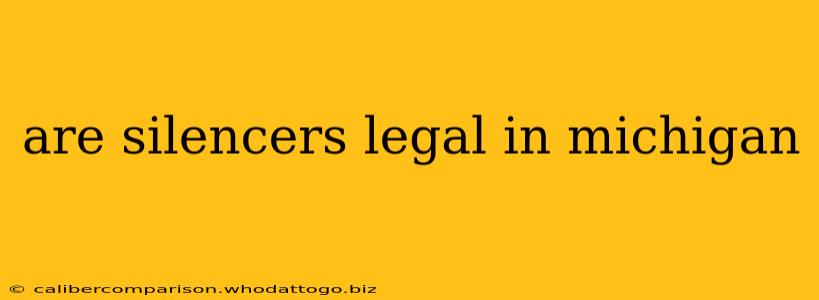The legality of silencers, often called suppressors, in Michigan is a complex issue, frequently misunderstood. While the term "silencer" is commonly used, the more accurate term is "suppressor," as they don't silence a firearm completely, but rather significantly reduce the sound. This article will clarify the legal landscape surrounding suppressor ownership and use in the Great Lakes State.
Michigan's Stance on Suppressors
Michigan law allows for the legal ownership and use of firearm suppressors, but with crucial stipulations. The key lies in adherence to both state and federal regulations. Ignoring either can lead to serious legal consequences.
Federal Regulations: The National Firearms Act (NFA)
The National Firearms Act (NFA) of 1934 governs the manufacture, transfer, and possession of suppressors at the federal level. This act mandates a rigorous process, including:
- Registration: Suppressors must be registered with the Bureau of Alcohol, Tobacco, Firearms and Explosives (ATF).
- Background Check: A thorough background check is conducted by the ATF before approval is granted.
- Tax Stamp: A significant tax stamp must be paid for each suppressor registered.
Failure to comply with these federal requirements can result in severe penalties, including hefty fines and imprisonment.
Michigan State Laws: Adding Another Layer of Complexity
While Michigan doesn't explicitly prohibit suppressor ownership, it's crucial to understand the state's specific laws regarding firearms in general. These laws can impact the permissible use and transportation of suppressors. For example, Michigan has specific regulations regarding:
- Concealed Carry: The legality of carrying a firearm with a suppressor concealed may be subject to additional restrictions under Michigan's concealed pistol license (CPL) laws.
- Hunting Regulations: Using a suppressor during hunting may be restricted or prohibited depending on the game and hunting season. It's imperative to consult the Michigan Department of Natural Resources (DNR) for the most up-to-date information.
- Discharge of Firearms: State laws governing the discharge of firearms in various locations (e.g., residential areas, public spaces) will still apply even when a suppressor is used.
Navigating the Legal Maze: Steps to Take
If you're considering owning a suppressor in Michigan, carefully follow these steps:
- Understand Federal Regulations: Thoroughly familiarize yourself with the NFA's requirements. The ATF website is the definitive source for this information.
- Consult with Legal Counsel: Seek advice from an attorney specializing in firearms law in Michigan. They can help you navigate the complexities of both federal and state regulations.
- Proper Registration: Complete the necessary ATF paperwork and background check process accurately and diligently.
- Stay Updated on Laws: Firearm laws, at both the state and federal levels, can change. Stay informed about any modifications that could affect suppressor ownership or usage.
Conclusion: Knowledge is Key
Owning a suppressor in Michigan requires meticulous attention to detail and a comprehensive understanding of the applicable laws. Failure to comply with either federal or state regulations can lead to severe legal repercussions. Always prioritize compliance and consult with legal professionals to ensure you're operating within the bounds of the law. Remember, this information is for guidance only and does not constitute legal advice. Always consult with relevant authorities and legal professionals for definitive answers.

